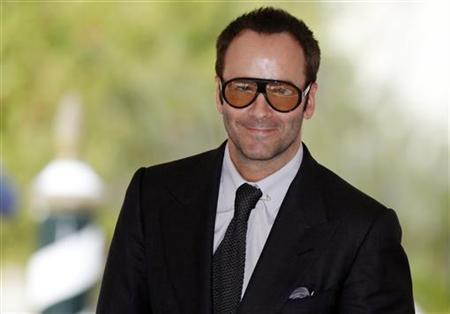
Fashion designer and film director Tom Ford arrives at the 66th Venice Film Festival September 10, 2009. Ford is competing for the Golden Lion Award with his film "A single man".
Designer Tom Ford makes a surprisingly successful leap from the fashion industry to the big screen with "A Single Man," a standout directing debut about a gay college professor who loses his longtime partner.
The theme of the search for meaning after a great loss is developed with great sensitivity, thanks to Colin Firth's moving performance in the main role, and should help the film go beyond gay audiences, who will be its strong supporters, to attract the more mainstream attention of "Brokeback Mountain" and "Far From Heaven."
Based on a novel by Christopher Isherwood, the screenplay by Ford and David Scearce is concise and to the point. It opens on a fatal car crash in 1962, in which Jim (Matthew Goode) is killed. George Falconer (Firth) learns about his lover's death the next day when a relative phones, but he is warned not to attend the funeral of the man he lived with for 16 years.
Broken-hearted and alone, he seeks comfort from his long-ago flame, now friend, Charley (Julianne Moore), who is obviously still in love with him. But George is too devastated to be interested in either sex, and even rebuffs the approach of a hot young hustler played by Jon Kortajarena, who is a true James Dean lookalike. He tries to avoid getting involved with his student Kenny (Nicholas Hoult of "About a Boy"), who is just discovering his sexual preferences and aggressively courts the older man. Instead, he makes plans for committing suicide.
Most of the action takes place over the course of a single day in Los Angeles in the early '60s, when being gay was socially disapproved of by many. The film brushes ever so lightly on the issue of discrimination, first implicitly, when George lectures his students on how society fears what it is not, and later in a beautifully calibrated tete-a-tete between George and Charley, when she insinuates George and Jim did not have a "real relationship."
Through snatches of their life together, it is apparent that George and Jim had a very real and loving relationship whatever 1960's America thought. Their love story is contrasted with the next-door neighbors, who are down-to-earth suburbanites busy raising families and building nuclear bomb shelters. When a colleague tells George there won't be time for sentiment when the bomb falls, George characteristically retorts that he's not interested in living in a world without feeling.
Firth's measured performance, delivered in a clipped British accent, has just the right restraint, and the intelligent dialogue is a pleasure. Moore is glamorous and likeable as the alcoholic divorcee Charley, adrift without a husband. Goode and especially Hoult are just too perfect to be true, but they serve the purpose of offering George good reasons to stay alive. In contrast to Firth's underplaying, the directing has its overblown, operatic soul. Ford is unafraid of such cringe-worthy moments as playing an opera solo over a suicide attempt, or having a nattily dressed symbolic figure in Tom Ford Menswear give the kiss of death to the recently departed. In the same spirit, tech work is satisfyingly bold. Dan Bishop's stylish production design and Eduard Grau's cinematography set the film in a romantically idealized '60s world. The film score, written by Abel Korzeniowski and Shigeru Umebayashi, is variegated and full of lush orchestral themes that salute Hitchcock and Bernard Hermann, among others.





